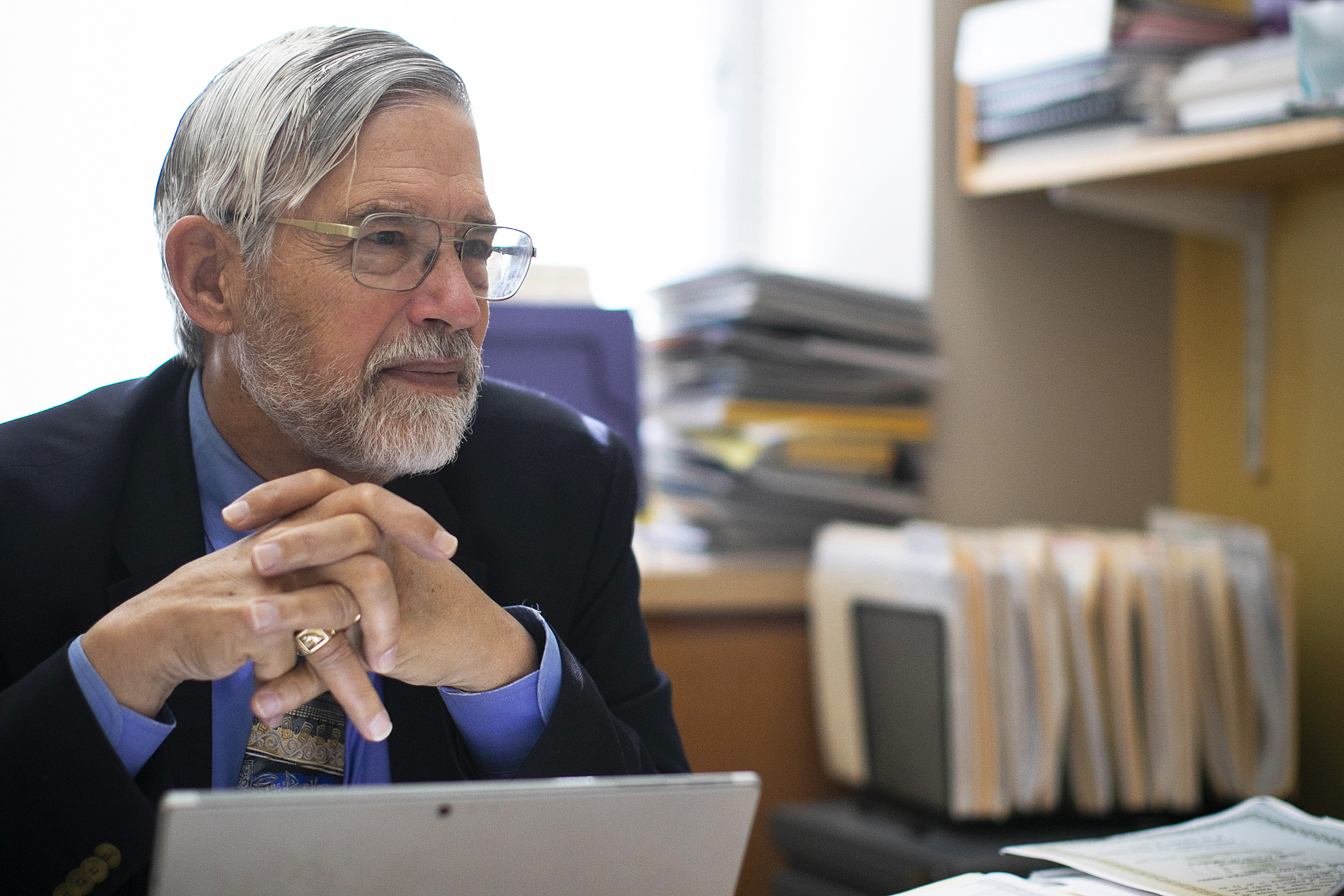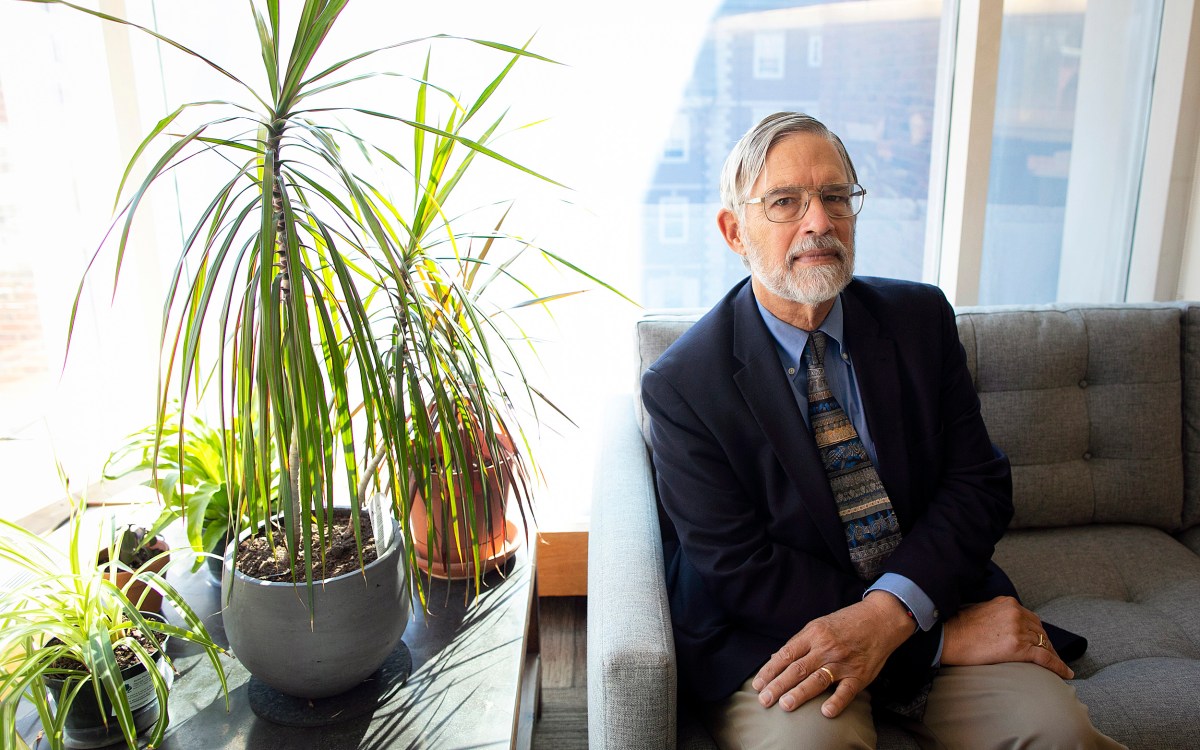
John Holdren, professor of environmental science and policy, ran the White House Office of Science and Technology Policy under the Obama administration.
Stephanie Mitchell/Harvard file photo
Is science back? Harvard’s Holdren says ‘yes’
Ex-Obama adviser says, unlike Trump, Biden and Harris will embrace factual analysis
With the creation of a coronavirus advisory board among its first acts, the incoming Biden-Harris administration has moved quickly to reinstall science as a foundation for government policy after four years of a president who disdained accepted scientific wisdom on subjects from wildfires to hurricane tracks, climate change to COVID-19. The Gazette spoke with John Holdren, Teresa and John Heinz Professor of Environmental Policy at the Harvard Kennedy School and professor of environmental science and policy in the Department of Earth and Planetary Sciences, about what the reversal means. Holdren, Barack Obama’s top scientific adviser as assistant to the president for science and technology and director of the White House Office of Science and Technology Policy, discussed the need to restore trust in scientific facts, their potential limitations, and their necessary interplay with other disciplines — including politics — in setting government policy.
Q&A
John Holdren
GAZETTE: In an era when everyone seems to have their own set of facts, how do you restore the public’s faith that science really does know what it’s talking about?
HOLDREN: There are a couple of dimensions to that. One is the role of the White House and the other is the role of the scientific community, including institutions like the [National] Academies of Science, Engineering, and Medicine, the American Association for the Advancement of Science, and the other professional societies.
It is tremendously important what attitude the president of the United States and the vice president take toward facts, toward science, and toward the use of science and facts in the formation of public policy. We had, with President Obama and Vice President [Joseph] Biden, a fact-friendly and science-savvy leadership. They appointed highly capable, nonideological people to the key science and technology positions across the administration. And that friendliness to facts and science propagated downward and interacted constructively with the inclinations of the career civil servants in the departments and agencies with science and technology responsibilities. Those inclinations have always been to use science and technology to advance the public interest.
That’s what we need to restore under President-elect Biden and Vice President-elect [Kamala] Harris. I think it will be restored once they are inaugurated. But even before, they are already saying all the right things in the course of this somewhat freighted transition. You see President-elect Biden and Vice President-elect Harris talking very constructively about how they will bring science and technology to bear on advancing the national interest. For example, a new panel on COVID-19 that will be advising Biden and Harris on crafting a comprehensive national response, which we have lacked, has already been announced. The panel is bipartisan; it is diverse in terms of gender, in terms of political affiliation, in terms of geography; and above all, it is a collection of absolutely first-rate people. That is going to be the hallmark of what Biden and Harris do in office: They are going to appoint competent people. They are going to listen to them. They are going to interact closely with them. Their science and technology experts are going to be in the room and at the table for the many policy discussions where science and technology are germane.
GAZETTE: And what about the role of the scientific community in restoring faith in science?
HOLDREN: I have said for a long time that every scientist and every engineer in this country should tithe 10 percent of her or his time to engaging with public policy and with public education on science and technology issues. We no longer have the luxury of staying in our laboratories, of sitting at our desks working on advancing our science and engineering disciplines. We have to interact with broader society in ways that communicate what we’re doing, why we’re doing it, and why it matters. The scientific community has to get better at telling informative stories about how science works and about what it is doing in support of the aspirations of the American people.
GAZETTE: How do you handle the cultural divide between science and politics and account for normal scientific uncertainty without undermining what we know as facts?
HOLDREN: There are short-term approaches to that dilemma and longer-term approaches. Starting with a longer term, we have to do a better job in our schools, at the K through 12 level, with science education. Our K-12 science teachers have been spending too much time instilling facts about what science knows and too little time instilling understanding of how science works — what the sources of progress are, the sources of error correction, peer review, the sources of credibility and authority in science. We cannot expect the entire population of the country to be sufficiently educated about scientific matters to sort out technical controversies on the details of climate change, the details of COVID-19, the details of the interaction of science with economic policy. But what we can expect is to develop in the public a greater understanding of how science works and what the sources of credibility and authority in scientific findings are. We need to surmount the liability from which we have suffered for a long time. In many facets of the media there has been a preoccupation with “balance” that has led to overwhelming scientific consensus on one side being countered with tiny minorities of dissenters who somehow get equal time and equal weight. People need to understand what the National Academy of Sciences is and how it works; what the National Academies of Engineering and Medicine are and how they work; how the great professional societies — the American Geophysical Union, the American Association for the Advancement of Science, the American Physical Society, the American Chemical Society — work and why the considered positions of these bodies deserve more weight than the voices of a very small number of contrarians, on whatever issue.
“If scientists absent themselves from the policy process, society loses a very important set of voices from its policy discussions.”
GAZETTE: What about the short-term answers?
HOLDREN: The shorter-term solution is what we already talked about: scientists, engineers, and innovators getting better at explaining not just what they know, but how they know it. What I have found to be extremely effective in my communications about climate change, for example, is not just to explain what we know, but to explain how we know it in terms of the converging lines of evidence from observations, analysis, and modeling, and from paleoclimatology — the study of how climate has changed over the millennia under natural influences, which helps us understand that human influences have now overwhelmed the natural ones.
The other thing I’ve learned is that it’s important to start by listening to people with contrary views — by asking them what they think before starting to lecture them about what you think. When I am discussing climate change or energy policy with people who hold views drastically differing from mine, for example, I have found it most effective to start by listening respectfully to what they think and why they think it. Then I can craft my response to the specific concerns that have animated their views. If you listen first, you will get a lot further in communicating with people with views different from yours.
GAZETTE: What is an example of a classic, successful government policy backed by good science? I’m thinking back to the Montreal Protocol for ozone depletion, or Apollo. Those had political backing, but they were also underpinned by good science. What to your mind is the classic example?
HOLDREN: I would point to the Paris Agreement, which was an immense step forward in which 195 countries all across the world committed to take constructive steps toward reducing their climate-altering emissions going forward. The industrialized countries of the world also committed, in the Paris Agreement, to sharply increase their assistance to less-developed countries for their efforts not only on emission reductions but also on adaptation, preparedness, and resilience against the changes in climate that can no longer be avoided. That was all based in science and scientists were extremely effective in helping to develop that international consensus that the agreement embodies. Many of us in the U.S. scientific community were involved over the decades preceding the Paris Agreement with scientific colleagues and policymakers in China, India, Russia, Brazil, Mexico, Indonesia and many other countries, laying the foundation for international consensus on what needed to be done. And it worked.
GAZETTE: Didn’t I hear that the day after the election was the day we actually withdrew from the Paris Agreement?
HOLDREN: That is true. The agreement requires that a country must give three years’ notice before actually exiting. But the sad fact is that President Trump, when he announced in 2017 his administration’s intention to withdraw, immediately terminated virtually all U.S. efforts to comply with the commitments that the United States made in Paris. So we had effectively withdrawn long before the formal withdrawal the day after the election. But I think our participation will be very quickly restored by our new president, and the rest of the world will welcome the return of U.S. participation and leadership on global climate change. There are, of course, many, many other examples of policies successfully driven, in substantial part, by understandings from science and technology.
“That is going to be the hallmark of what Biden and Harris do in office: … They are going to interact closely with them. Their science and technology experts are going to be in the room and at the table for the many policy discussions where science and technology are germane.”
GAZETTE: When we talk about the intersection of science and politics, should scientists be saying, essentially, “Do this. We’ve studied it. We believe this is the best course”? Or should they be presenting politicians with a menu of options? With climate change, I’m thinking of the role of nuclear power. From a strictly carbon standpoint, it seems nuclear would be an important part of the mix. But clearly there are a lot of voices saying, “Nuclear should go too.”
HOLDREN: It is very important that, in talking about these matters, scientists separate what they know or believe as scientists from what they prefer as citizens in terms of public policy. It’s very important to distinguish between issues of fact and issues of values and preferences. And it’s possible, in my view, for scientists to do that successfully. Some people say that scientists should simply stick to their science, confine themselves to clarifying what they understand to be the scientific realities, and not talk about policy at all, that to do so is to politicize science. I reject that view. If scientists absent themselves from the policy process, society loses a very important set of voices from its policy discussions. I often tell my students that the facts about science and technology are not everything in public policy, but they are usually something. They matter. Of course, policymakers are not always going to make the choices that scientists would prefer. That’s OK, because other sources of insight and value are also relevant and it’s appropriate for policymakers to take them into account.
GAZETTE: What would you advise the Biden administration as a top priority once they take office?
HOLDREN: I think President-elect Biden and Vice President-elect Harris have already made clear that their highest priority has to be recovery from the COVID-19 pandemic. The economy cannot flourish; science and technology cannot flourish; and the climate-change issue cannot be addressed successfully unless and until we master the COVID-19 challenge. Biden and Harris are completely right about that.
At the same time, I think they’re going to give very high priority to the restoration of the vitality and inclusiveness of the U.S. economy. President-elect Biden comes from a working class. He understands the predicament of working people in this country, and he is determined to address it. He also knows that immigration reform is related to the economy, as is leadership in science and technology, as are fundamental American standards of ethics and humaneness. And restoring a humane and science- and technology-friendly immigration policy will likewise be a boon to the economy and will be a priority for the Biden administration.
In the climate space, the Biden-Harris administration will not only rejoin the Paris Agreement, but without question they will restore many of the Obama administration executive orders on emissions reduction and climate-change adaptation, preparedness, and resilience that were rescinded virtually immediately by President Trump following his inauguration. I am still hopeful, by the way, that when the two remaining races for the Senate in Georgia are sorted out, the Democrats will finally again control the Senate and it will become possible then to move forward on climate change with Congress’ help, rather than its opposition.
Another very high priority is going to be restoring U.S. relationships internationally. I think one of the many consequences of President Trump’s fecklessness and unpredictability is a loss of confidence — a loss of trust — in the United States as a reliable partner in international arrangements. I believe Biden and Harris are going to be at pains to restore those relationships, to restore confidence in the United States as a partner. That will require rebuilding the U.S. institutions that nourish these relationships. Under Trump, the State Department has been hollowed out, the Environmental Protection Agency has been hollowed out, and a real former bastion of administration competence, the White House itself, has been hollowed out. Fixing all that is broken is going to be a big agenda, but I have every confidence that Biden and Harris are going to prove to be up to it.
GAZETTE: How handicapped will a new administration be if the Senate has a Republican majority? Clearly, a lot can be done with executive orders, but can everything be done that needs to be done?
HOLDREN: No, everything cannot be done with executive orders. It is much better to get major things done with the help of the Congress through legislation, which is, of course, much harder to unwind than executive orders are. I hold out hope that even if the Senate remains with a Republican majority, the fact that President-elect Biden has had a longstanding and generally productive relationship with Senate Majority Leader Mitch McConnell will make it possible to have greater collaboration and cooperation once Trump is gone and the dust settles. There are so many inherently bipartisan national projects waiting to happen; we simply must hope that Republicans and Democrats will be able to work together to get it all done.
Interview was lightly edited and condensed.







